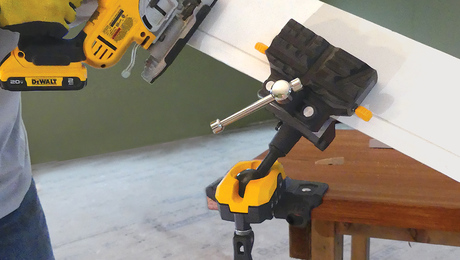Hello,
I have a two year old sprinkler system in my house. Recently, it had a pin hole leak at one of the connections. My contractor came out and with the help of a new sprinkler contarctor (The original contractor wouldn’t come back.) fixed the leak. They also said that the water pressure coming to the house was too much for the system to handle. So, they installed a pressure relief valve. Unfortunately, when it releases, and it has twice in three weeks, i lose about 50 gallons of water. It is now also constantly dripping about a gallon of water every half hour. Is there a better way to deal with this water pressure situation? Can’t the water pressure be reduced before it gets to sprinkler system?
Any thoughts would be welcome.
thanks,
sean
Discussion Forum
Discussion Forum
Up Next
Video Shorts
Featured Story

The IQ Vise has angled jaws, a simple locking mechanism, and solid holding power.
Featured Video
How to Install Exterior Window TrimHighlights
"I have learned so much thanks to the searchable articles on the FHB website. I can confidently say that I expect to be a life-long subscriber." - M.K.
Fine Homebuilding Magazine
- Home Group
- Antique Trader
- Arts & Crafts Homes
- Bank Note Reporter
- Cabin Life
- Cuisine at Home
- Fine Gardening
- Fine Woodworking
- Green Building Advisor
- Garden Gate
- Horticulture
- Keep Craft Alive
- Log Home Living
- Military Trader/Vehicles
- Numismatic News
- Numismaster
- Old Cars Weekly
- Old House Journal
- Period Homes
- Popular Woodworking
- Script
- ShopNotes
- Sports Collectors Digest
- Threads
- Timber Home Living
- Traditional Building
- Woodsmith
- World Coin News
- Writer's Digest


















Replies
Your system should have a gate valve. Why not just turn it down a few knotches.
Boris
"Sir, I may be drunk, but you're crazy, and I'll be sober tomorrow" -- WC Fields, "Its a Gift" 1927
A pressure relief valve is an odd things to add for an over pressure problem. You are trying to stop leaks, not have a bigger one during over-pressure conditions.
Correst answer: A pressure regulator would maintain, for instance, 20 psi on the downstream side even while the city water fluctuated from 40 to 80 psi. Straight forward to find and install, at least by a plumber of middling compentence.
Regarding closing a gate a few turns: this would only reduce the pressure while there is flow (i.e. while the sprinklers are running). It would nothing to reduce the pressure while the system is off. If your problem is only while the system is running, then closing partly would reduce the pressure, but it will be tricky to get it closed enough but not too much. A pressure regulator is the way to go.
Or, cheaper but more labor intensive: Just close the valve to the system until you want to use it. This would defeat any auto-timer operation, but would be a quick fix if you only run the sprinklers in manual mode.
David Thomas Overlooking Cook Inlet in Kenai, Alaska
Edited 4/15/2002 3:26:44 PM ET by David Thomas
You said IN YOUR HOUSE. Is this a fire safety sprinkler system or a lawn irragation sprinker systems?
Where does it have a checkvalve or reverse flow valve in the system? Where is the pressure relief valve in relation to the checkvalves or reverse flow valves? You may need an expansion tank.
But first you need to get a pressure meter on the system and monitor over some time to see what kind of range of pressures that you are seeing.
Yes, it is a fire safety sprinkler system in my house.
It has a pressure guague on it that reads about 150-180.
150 - 180 is very, very high. Is that the natural city pressure or is there some kind of boost pump in the system?
At least for domestic use you need a pressure reducer or else you would be busting the bottom out of sink when you turn the faucett on.
Now I don't know ANYTHING about fire sprinkers and you might need that very high pressure for it to meet it's flow ratings. And I would make sure that any pressure reduction valve was approved and rated for that service.
You need to get a specialist to check on this.
Not only is 150 very high, my eyebrows arched about two inches when I read that. You definitely need a mechanical engineer to sort this out.
Excellence is its own reward!
Contact your municipal water supply utility. They might have a maladjusted pressure switch or such on your supply line. I'm not a plumber but I have seen a sticky switch on a private well cause problems. I don't know what the pressure should be for your system but 40 to 60 psi seems about average around here.